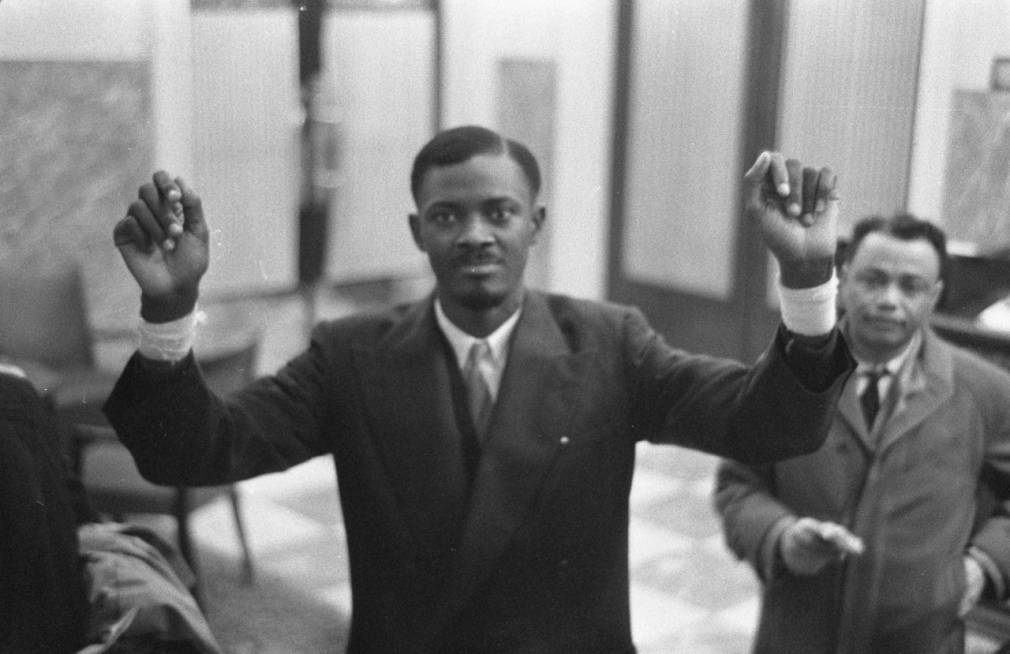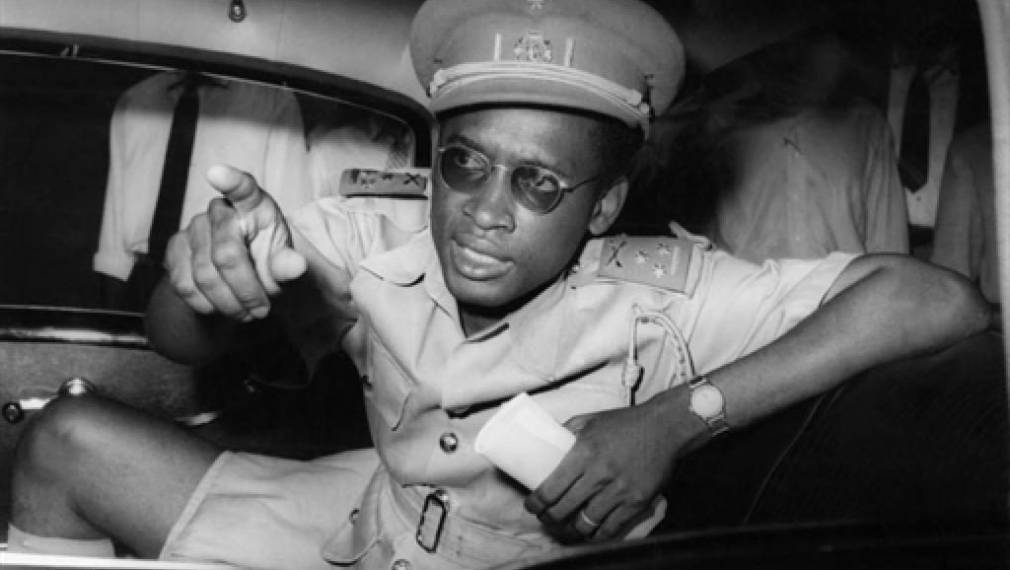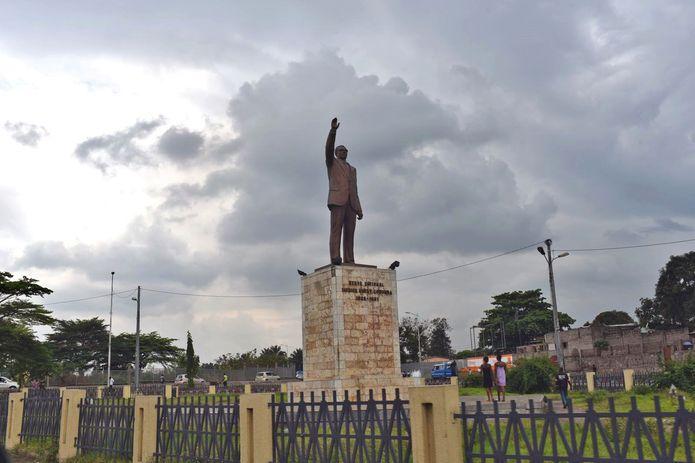Lumumba, a national hero
#CongoFreedom (episode 3) by Vladimir Cagnolari
On June 30th, 1960, the entire population of the Congo, and in particular its capital Lépoldville, danced “the independence cha-cha”. But menacing clouds would soon darken the Congolese skies. Prime Minister Patrice Lumumba would come to pay the price for his actions. His name remains forged in people’s memories, and in the songs that tell his tragic story.

Just four days after proclaiming independence, Congolese soldiers rebelled: they wanted the same benefits as the white Belgian officers living in luxury, whilst they felt they were being treated like slaves. In fact, the Belgians were still occupying the country. The head of the Public Force, General Janssens – responsible for maintaining order –, gave them a lecture and wrote on a large board: “For the Public Force, ‘Before independence = After independence’ “.
The soldiers mutinied further. Inland, they kidnapped officers and attacked Belgian civilians. Panic arose, and within a few weeks 30,000 Belgians fled the country. The Congolese army was no longer under control, the Belgian civil servants had left, and to top things off, Belgium sent in the paratroopers.
To add insult to injury, less than ten days after independence, the province of Katanga, the Congo’s land of mineral treasures, proclaimed its independence. It obviously received the support from Belgium, a country which kept most of its interests there (and previously encouraged the separation).
Lumumba and President Kasavubu appealed to the UN, and the transnational organization were more than happy to ask Belgium to withdraw their military troops. However, with little effect. So the two heads of government chose to appeal instead to Moscow. In this diplomatic attempt, Westerners would find the ideal premise to decide upon Lumumba’s fate. It became evident that the new Africa which had begun to free itself had already become a playground for the East and West to compete against each other. Moscow threatened the USA-supported side and the UN eventually sent peacekeepers to put out the fire. As an added bonus, the province of Kasai also broke away. A real low-blow… President Kasa-Vubu dismissed Prime Minister Lumumba, with the approval of Parliament. As the writer Amadou Kourouma put it, “A mess upon a mess: a monumental mess!” Mobutu, now a colonel, neutralized the two political figures, with the kind assistance of the CIA. He formed an interim government and surrounded Lumumba’s residence, which was guarded by UN peacekeepers. Lumumba tried to escape, but was caught on December 1st, five months after his famous speech. Lumumba now arrested, he was photographed wearing a short-sleeved shirt, with messy hair and a crazed look in his eyes, a picture that would soon spread quickly around the world (see INA archive).
One month later, they transferred him to Elisabethville, the Katangese capital. There, with two of his loyal companions, he was executed by the Katangese troops under the supervision of Belgian officers. His body was then dug up and dissolved in sulfuric acid. Just to prevent people from paying worship to him. The Congo was in distress, and Patrice Emery Lumumba, the democratically elected Prime Minister, was no longer alive. Shortly after, Franco Luambo Makiadi and The OK Jazz composed “Liwa Ya Emery” – “the death of Emery”.
In a political testament, Lumumba wrote a last letter to his wife before he was executed:
“My dear partner,
I write these words to you without knowing if they will reach you, or when they will reach you and if I’ll still be alive when you read them. In the course of my struggle for the independence of my country, I have never doubted for a single moment our victory in the sacred cause to which my companions and I have dedicated our entire lives to. But what we wanted for our country – its right to an honorable life, to moral dignity, to unrestricted independence –, was never what the Belgian colonialists and its Western allies wanted, who received direct, indirect, deliberate and non-deliberate support among senior United Nations officials – the very organization in which we placed our full confidence in, when we called on it for assistance.
They have corrupted some of our compatriots, they have contributed to distorting the truth and to defiling our independence.
What else can I say? That whether dead, alive, free or in prison on the orders of the colonialists, it is not me as a person that counts. But it’s rather the Congo, it’s our poor people whose independence has been shaped into a cage which we are looked at from the outside – sometimes with a benevolent compassion, sometimes with joy and pleasure. But my faith will remain unshakable.
One day, history will have its word – but it won’t be the history they teach in Brussels, Washington, Paris or the United Nations, but rather the history that we will teach in countries freed from colonialism and its puppets. Africa will write its own history and, north and south of the Sahara it will turn into a history of glory and dignity. Don’t cry for me, my partner. I know that my country, which has suffered so much, will find a way to defend its independence and its freedom.
Long live the Congo! Long live Africa!“
Patrice Lumumba
Lumumba is dead and the Congo is K.O. This is when Mobutu, a former friend of Lumumba’s and his protégé, became general and Military Chief of Staff for the Congolese army. He and other figures of the new government would have songs made about them (cf. the playlist “Gouvernement Ya Congo”). If there’s one thing that’s certain: in Congo, there’s always someone there to sing to the leaders.

In Congo, six months later, the “independence cha-cha” gave way to the worst hangover ever. Mobutu, with the help of the North Americans, succeeded in crushing both the Katangan dissension and the rebellion led by supporters of Lumumba. He eventually took power, and became an absolute authoritarian leader. Five years on from the independence, he had mastered running the country, and even redeemed Patrice Lumumba, turning him from the figure of the assassinated activist into a national hero. It’s unbelievable how certain political leaders have a tendency to declare their love post-mortem to the ones they betrayed so hard. He even dared to ask the great Franco to erect a musical monument to “Lumumba, A National Hero”. This became the title of the song he composed, five years after mourning the death of the martyr.
“So Mobutu, follow the path you agreed with Lumumba.
When Mobutu speaks, it’s as if Lumumba was resuscitated.
Oh, Mobutu! Lumumba died for the economic independence of the country.”
Lumumba is dressed up in the colors of the MPR, Mobutu’s Popular Movement for the Revolution: and that’s the final nail in the coffin! This predicament in fact, became the closing scene of Césaire’s play, Une Saison au Congo, where Mobutu is renamed “Mokutu”. Mokutu, therefore, inaugurates the “Lumumba Boulevard” and, after praising the man he calls Patrice, prays quietly to himself with himself. The crowd then shouts “Lumumba! Eternal glory be to Lumumba”.
Mokutu addresses one of his ministers: “Enough! I am sick of these rascals! These people must know that there are limits, and I will not tolerate that they go beyond them. Charge at them!” Then, to the chief of his own guard, now running up to him: “Come on! Clean up this mess! And fast! So these simpletons understand that we keep our powder dry and that the show is over. Fire!”
Lumumba has since remained a key figure in the fight against colonialism, and his name was sung in places as far-reaching as Cuba (Carlos Puebla, who would later sing Che Guevara’s praises in “Hasta Siempre”), Nigeria (E.C. Arinze) and Mali (Maravillas du Mali).
